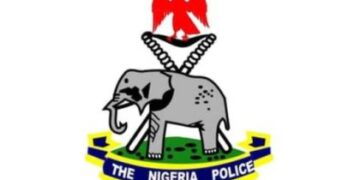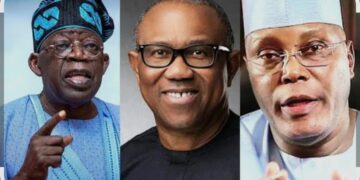By Emameh Gabriel
The APC’s National Working Committee and Progressive Governors Forum have officially declared President Bola Tinubu the party’s sole candidate for 2027—a full two years before the election. APC National Chairman, Abdullahi Ganduje, with the enthusiasm of a man who knows where his bread is buttered, announced the endorsement as a foregone conclusion. And frankly, it is.
This means, no credible challenger to Tinubu exists within the APC. His decades of party-building outweigh any opposition, much like a landlord’s claim to a fully developed property. Having overcome fierce resistance during the 2022 primaries, his position is now unassailable.
Any attempt to challenge him today would be political futility. The structural advantages, loyalty networks, institutional memory, and sheer force of political good will—render internal dissent irrelevant. This isn’t speculation; it’s the reality of a machine engineered over decades.
President Tinubu’s appearance at the APC National Summit wasn’t just a message but a show of genuine dominance. He spoke like a man who had already seen the score of a proposed match, casually predicting more victories. His reason is clear, just as he said: “You don’t blame people for bailing out of a sinking ship.”
For those still struggling with the metaphor: the opposition is the sinking ship, and Tinubu is not sending a rescue boat to a party that has refused to accept it’s distressed or ready to rebuild itself from within. Instead, he is simply standing on the sturdy deck of the APC, waving cheerfully at drowning politicians and shouting, ‘Freedom of movement, Lads! Swim faster!
For clarity: the opposition is that ship, and Tinubu isn’t sending rescue boat. He is on APC’s sturdy deck, waving at drowning politicians while quoting “freedom of movement”—a constitutional principle that, in practice, means one-directional defections. In other words, joining the APC isn’t jumping ship, it is boarding the only vessel actually going somewhere
President Bola Tinubu has demonstrated a singular understanding of Nigeria’s political landscape throughout his career. His approach reflects the accumulated wisdom of a leader who has operated at the highest levels across countless political eras. Where others see challenges, he discerns opportunities through his deep grasp of Nigeria’s complex dynamics. His ability to anticipate developments has consistently kept him ahead of the curve—a quality that has cemented his place as one of Nigeria’s most enduring political figures.
For the main opposition PDP, it has yet to recover from its self-inflicted wounds, if anything, its condition continues to deteriorate. The Labour Party remains torn between its identity as a movement or a political party. As for the others? They are still awaiting their moment in the spotlight.
The opposition’s current strategy, a mix of idealism and staged protests, has done little to counter the APC’s steady absorption of their ranks. Meanwhile, the ruling party presses forward, systematically clearing every hurdle on the path to 2027. The truth is, when a leader constructs an uncommon political engine, one capable of dismantling an established regime, even rivals recognize its momentum. Alignment becomes inevitable.
Across the aisle, frustration festers. Like a football coach watching his star players exit mid game, the opposition spends more energy assigning blame than rebuilding. Their new rallying cry today is that ‘Nigeria is sliding into one-party rule’. This simply explains their erosion. The critical questions remain unasked: What did Tinubu and the APC do in 2015 that made victory possible? What is he still doing today that draws defectors to him despite nation’s current economic strains?
For Nasir el-Rufai, one of Nigeria’s favourite political nomad, has again announced his new love interest in the African Democratic Congress (ADC). Just months after his fling with the Social Democratic Party (SDP) crashed harder than a poorly maintained Danfo bus, the former Kaduna governor has set his sights on a fresh political romance. Just this week, he declared the ADC the opposition’s new “bride” for 2027, apparently forgetting that his current political marriage with the SDP is limping away, bruised like a bicycle after a pothole experience.
El-Rufai’s courtship of the SDP was a classic case of unrequited love. He jumped on their horse, whipped it into a gallop, and then realised nobody was following him. The party was left wheezing like a generator on its last liter of fuel, while political spectators watched from the sidelines, placing bets on how long before the whole thing collapsed. Now, he has swiped right on the ADC, hoping this time, someone, anyone, will actually show up for the wedding.
On his part, Atiku Abubakar now plays opposition leader to an audience that’s exited the theater long ago. His grand coalition overtures meet empty chairs, even PDP governors have relocated their political capital elsewhere, leaving him the last patron at a closing establishment
Even his emissary, el-Rufai, has returned from his SDP expedition with bad news: there is nothing there for us. Atiku’s political strategy now looks like a worker who keeps resubmitting rejected proposals with different fonts. The board has said no, accounting stopped budgeting for it, and the office plants look concerned – yet he is still scheduling quick syncs about his revolutionary new approach.
The former vice president might end up the biggest loser in 2027, not because he didn’t fight, but because he is going into a war with the wrong person (Tinubu) who knows how to write the rules better.
At this point, the only real suspense ahead of 2027 is just how many opposition members will cross over before the election. Tinubu has already rolled out the welcome mat, and history suggests that Nigerian politicians rarely resist the allure of a winning team, especially when the alternative is irrelevance.
So, to the opposition, a word of advice: Either find a way to plug the holes in your sinking ship or start practising your APC membership card pose. Because as things stand, Tinubu isn’t just predicting a landslide, he is already measuring the curtains for another four years.












































Discussion about this post